#and the priest character is actually really cool like a lot of media portrays priests as villains and im glad they didn’t do that here
Explore tagged Tumblr posts
Text
ok first murder drones now spooky month depression
#did indie animation wake up and choose angst#not complaining it’s yummy but#I wasn’t expecting angst fromSPOOKY MONTH?????#and the priest character is actually really cool like a lot of media portrays priests as villains and im glad they didn’t do that here#these past few days in indie animation have been actually insane#yesterday was the lackadaisy anniversary and the release of murder drones 7 which was a ROLLERCOASTER#and then the day after that spooky month releases with DEPRESSION#indie animation is so good it’s not even funny#I hope more people become aware of indie shows so they become the new standard#like I dont want all of these plain movies/series we have been seeing from these major productions (with some exceptions ofc)#and with indie animation rising I hope it dis encourages AI use in creative media#because AI can’t make something with such a detailed and in depth plot as humans can#I mean it could eventually(?) but if you have ever interacted with AI you may notice many flaws#this has turned into an essay it’s not even tags anymore but im just psyched for indie animation#murder drones#spooky month#lackadaisy#indie animation#kind of a rant
20 notes
·
View notes
Text
Coup De Main Magazine Interview: Dylan O'Brien on 'Love and Monsters'.

Dylan O'Brien really, really, really loves dogs. Fondly referring to his adorable co-star as "completely the star" of his new Oscar-nominated film, 'Love and Monsters, O'Brien's face lights up like a Christmas tree when reminiscing about the two Australian Kelpies, Hero and Dodge, who together portray his onscreen best friend, Boy (a.k.a. the best dog in the world).
At the heart of 'Love and Monsters' is this dynamic duo, with O'Brien as Joel Dawson, who in a post-apocalyptic world overrun by giant monsters decides to set off on a dangerous journey to reconnect with his high school sweetheart (played by Jessica Henwick), seven years after the Monsterpocalypse forced all of humanity into hiding underground.
An endearing tale of a wide-eyed boy and his loyal dog, we caught up with Dylan O'Brien to discuss 'Love and Monsters' which was filmed in Queensland, Australia...

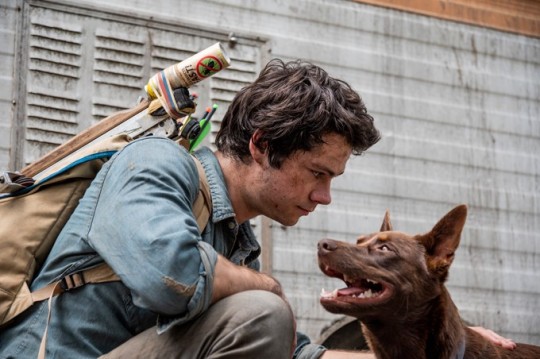
COUP DE MAIN: Congrats on the Best Visual Effects Oscars nomination for 'Love and Monsters'! You're in the film, so for the purposes of this interview, I think you can own that.
DYLAN O'BRIEN: Thank you! Oh absolutely, I am nominated. I've been telling everybody: I'm an Oscar nominated actor now.
CDM: You did it!
DYLAN: Thanks! <laughs> It really is amazing.
CDM: It's funny that you filmed this movie back in March to May of 2019, but the whole situation of Joel finding himself separated from Aimee probably feels very familiar to anyone who started a relationship pre-pandemic that doesn't live with their partner.
DYLAN: Yeah, it's really weird. It's really weird how what we ended up going through when this movie was due to come out, how much it related to these themes that we're exploring in this movie. It's a very crazy coincidence.
CDM: Also, the sort of aversion to venturing out again into the outside world, that feels very relatable.
DYLAN: I know. Like when he first comes out of that hatch, he's breathing in the fresh air like it's strange. It's really strange.
CDM: I also thought of the current mask-wearing situation when Clyde says: "You can always tell in their eyes, just look at their eyes." People have had to do a lot of eye-reading this past year?
DYLAN: Right?! Oh, wow wow wow. I hadn't thought about that one.
CDM: One of my favourite things you've ever done is the 'Life Of A Hollywood Actor' video. What do you think the 2021 version of 'Life Of A Hollywood Actor' would look like?
DYLAN: <laughs> Thank you so much, first of all.
CDM: I rewatched it yesterday in preparation for this interview.
DYLAN: No way, thanks! That's really cool. Yeah, I love that character. I want to do something with him. What would the 2021 version be? I think he would definitely be taking the Oscar nom for himself, very seriously - like, the visual effects Oscar nom he would apply as being his, basically, and I think he'd try to bring that up and try to really ride that to get some work. He thinks this is gonna be a big career thing for him, and then he somehow fucks it up by being too overzealous.

CDM: Joel clings on to his memories of Aimee for seven years, replaying them in his mind so he can continue to relive them. Why is it that it's in human nature to mentally retreat into the past for comfort? And to look for a home in other people instead of building a solid home within ourselves?
DYLAN: That's really interesting... I feel like that's something instinctive, especially if you're going through a hard time or especially if something's shifted in your world negatively. I think there's uncertainty about the future and I always find in those situations a common link to wanting to find comfort in the past. I've gone through things, like times like that in my own life, and I've always found that when I've gone through a time like that, there's this level of uncertainty. I think it's human instinct and sort of this instinct to protect ourselves in a way. We're a wild species, aren't we? We're very emotional creatures. I think that's part of what makes humans so special. And instincts like that, to preserve and protect our heart and mind, and to hold on to things like that. And the way we're attached to memories like that and nostalgia. There's a reason these things are a part of our fabric. We're very emotional creatures.
CDM: Do you think that love or fear is a stronger emotion?
DYLAN: Whoah, that's pretty wild. I would say love - only because I feel like it has this sustainable power to endure over time. Whereas fears can be fleeting, and even if it comes quick, it's gone. But then also... yeah, I don't know. <laughs> We're getting deep. Real deep!
CDM: Is love an action or a feeling?
DYLAN: WHOAH. <cracks up>
CDM: I'm putting you on the spot, sorry.
DYLAN: No, no, I'm good! I love it! They're very interesting questions. I'm cracking up at you choosing me to answer these. Fuck. I mean, I think it's a feeling. I believe that, at least. I'm trying to think of ways it could be an action, obviously, but that's not love. I feel like if it's an action, it's something else. There are actions that come from love, but the love, it's a feeling. That's what I believe.
CDM: I always think about how in the TV show, 'Fleabag', The Priest says, "Being a romantic takes a hell of a lot of hope. I think what they mean is, when you find somebody that you love, it feels like hope," which I feel like Joel would also relate to.
DYLAN: Yeah! I love 'Fleabag'.
CDM: It's so good.
DYLAN: It's SO good.
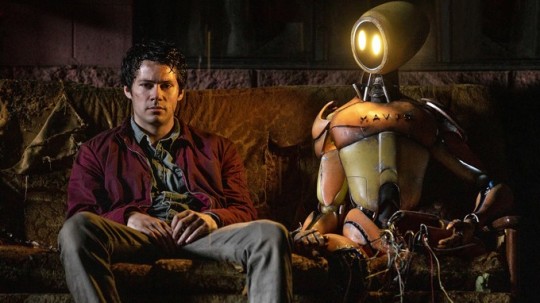
CDM: Clyde says to Joel: "Good instincts are earned by making mistakes." Do you agree or disagree with Clyde's life lesson?
DYLAN: Yeah, I think there's a lot of truth to that, for sure. I think that mistakes absolutely help us grow, in many ways, in terms of instincts and stuff. Yeah, I think that's a wise and sensible perspective to have, especially in an apocalyptic wasteland.
CDM: Do you have any cooking specialities like Joel's talent for minestrone?
DYLAN: Yeah, I've got some go-to's. They're all my mom's, like the things that are nostalgic for me that I grew up with that my mom cooks, like her chicken soup. It's the first thing I do if I go on a job or somewhere where I'm going to be for a little while, just to feel like I'm at home, the first thing I'll do is I'll make a soup and then I'll have it in the fridge for the first week that I'm there. I'll make my mom's chicken soup and it's a really nice comforting sort of a feeling. And chicken cutlets. Two very chicken-y things!
CDM: There's a line I love from the TV show, 'The Good Place', in which one of the characters says: "Sometimes, when you're feeling helpless, the secret is to help someone else. Get out of your own head." I was reminded of it in the scene where Joel is forced to take action against a monster to help save not himself, but his dog. Excluding the life or death element, have you ever felt similarly that it's been easier to help someone else first in order to help yourself?
DYLAN: Yeah, sometimes to a fault. I think that that's something that's been a bit of a learning curve for me, interestingly enough, pretty recently as well in the last year or two, to sort of realise that I need to try to help myself sometimes a little more. I think I have an instinct to help the people that I love and want to be there for them, or even a stranger sometimes, over myself, which can definitely be an interesting quality, but yeah, I think that's helping yourself. Taking care of yourself is extremely important and I think that we all sort of go through our own path of learning the importance of that, and ultimately, too, if you want to be helping others and helping your loved ones, you actually need to be taking care of yourself, first and foremost. Everyone comes to their own kind of realisation over it. It takes time. It takes your 20s, sometimes more.

CDM: Do you miss your dog co-stars Hero and Dodge?
DYLAN: Yes! Yes!! I do. Yeah, I really, really do. And Zelie [Bullen] as well. Their mom and trainer.
CDM: Do you have a dog yourself?
DYLAN: I've got little dogs, yeah. I've got little babies. You?
CDM: I don't sadly, but it's my life goal to adopt a dog one day.
DYLAN: You should. Do you want one? You should get one!
CDM: I'm gonna just tell everyone: Dylan O'Brien told me to get a dog, so I'm getting a dog now.
DYLAN: <laughs> I'm just part of this major life decision for you, forever now.
CDM: Social media can be such a vanity project, but I love that you only have Twitter, and use it mostly just for helping give a platform to important human right issues and sharing your love for Taylor Swift and Harry Styles. What are your favourite Taylor Swift and Harry Styles songs?
DYLAN: Oh my goodness. Like ever? For Harry, from Harry's last album, 'Watermelon Sugar', obviously. I think my my favourite one of his though is... What's it called? I can hear it in my head. They sing it on 'American Idol' all the time.Falling'! That's a huge one for me. T Swift, I mean, it's amazing - give any of the rest of us like six months in quarantine and we look back on it and we're like, 'Shit, I should have done more,' but give Taylor six months in quarantine and she writes fifty hit songs. It's incredible. Off 'Folklore', I think 'Mirrorball' doesn't get enough credit. I'm a big 'Mirrorball' fan. I love 'My Tears Ricochet', and 'Mad Woman', 'Epiphany', 'The 1'.
CDM: Basically the whole album.
DYLAN: Yeah, I really liked that one. There's so many more, but those are my highlights.
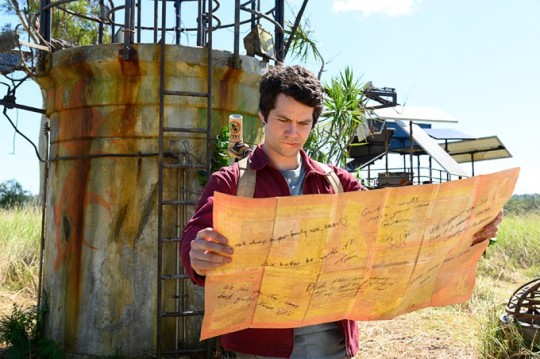
CDM: You used to be in a band, Slow Kids At Play, right? Would you ever want to get back into music professionally again?
DYLAN: I still play all the time, and I still play with friends who play as well. Even those guys. They're all still my good friends. We actually had a reunion show in 2019 and it was really cool. We jammed in our friend's garage for our hometown friends. Music will always be a part of my life. I always try to not let it be one of those things that you lose in life. I think that's important to do. If it's not your primary thing, it's sometimes easy to. Often years pile up and then you're like, 'Oh, man, I haven't done this thing that I love in so long, like, I should build that into my routine.' So yeah, I'll always play drums and always jam with friends and play. And yeah, it'd be cool to be in a band again. Maybe someday. Or even just to play a show again, like even just to sit in for someone would be awesome.
CDM: Then maybe you can come to New Zealand on tour.
DYLAN: On tour?! I don't think I'd get to that level, but I like that you have aspirations for me.
CDM: Why is it important to you to use your platform for good?
DYLAN: I think that's influenced by the time that we're in. Also coinciding with a time that I went through in my life and just sort of getting older. And for me, it just feels right in terms of the things that I want to use it for, or try to support, or bring to life, or amplify, or bring a light to, and I guess it's influenced by my own learning and growing and trying to be more involved in this stuff and educate myself on it. It sort of just mirrors that a little bit, and I do think it's important.
CDM: Thank you for your time today. And thanks for telling me to get a dog.
DYLAN: Go do it! Send me a pic when you get them. It was such a pleasure talking to you, thanks so much.
#dylan o'brien#love and monsters#love and monsters press#love and monsters netflix press#taylor swift#harry styles
82 notes
·
View notes
Note
For the Salty Asks- 3, 9, 11, 14, 16, 18.
Whoa, I guess that's kind of a lot. But I am genuinely interested. Your opinions always fascinate me.
omg baby do not apologize!! the more asks the happier i am. also :,) that is such a fucking lovely thing to hear and i am so v honored that you give a shit about my ramblings lmao you are so wonderful thank you a million times. okay moving on
3. Have you ever unfollowed someone over a fandom opinion-
For sure lmao but very rarely. im cool with people having different opinions than i do, i think that's kinda the point of media discourse and life would be boring otherwise so if i disagree with something i try to just let it go. sometimes there's dealbreakers but mostly if i unfollow its bc of personality/vibe/content conflict
9. Most disliked characters? Why?-
aside from the obvious (campbell and the pedo priest) i am not a fan of s2/s3 grace. this is hardly a surprise either, and i've gotten into my reasoning before so i won't repeat myself. honestly, there's moments where i don't like a lot of the characters, but it's less about the character and more about the writing itself. i think the /characters/ (aside from grace) are great , and most of the time i think their flaws are intentional and story-driving so i take no issue with not always "liking" them. grace is... somewhat a different story lmao
11. Is there an unpopular character that you like that the fandom doesn't? Why?
i love linda. i don't love her as a person, but i think she's portrayed accurately and (to me) empathetically. i think fandom tends to let the shelbys get away with literal murder bc we're meant to side with them, but the damage they do is real and inexcusable and i find linda a really good example of their destruction.
14. Unpopular opinion about your fandom?
I don't care that the shelbys (and specifically tommy) aren't good people and I don't have much interest in possible redemption arcs. again, not really that surprising lmao
16. If you could change one thing in the show, what would you change?
My only real gripe is the lack of a female character who is actually comparable to and equal to tommy. the closest we ever came was tatiana, and polly has her moments, but the general hierarchy is established and unwavering. it's hard to pick one thing bc i think there are a lot of equally pressing issues (lack of diversity, the use of Jessie, ect.) but personally I'd have to go with that bc it just grinds my gears so much
18. Does shipping something 'popular' mean you're in denial and/or biased?
Not at all lmao. If anything, I think that means that you're either picking up on the clues that the writers are intentionally leaving or you interpreted the media in the same way that many other consumers did, and that is pretty much the opposite of denial. you obviously don't /have/ to ship whatever is popular, but there's nothing wrong or biased about doing it. there's a reason popular things become so, after all
#personal#ask game#@kaciliz-peakybaby#thank u again sm for these i had so much fun with them!!#none of these opinions are particularly shocking to anyone thats been following me for long#but its nice to get a concise look at my perspectives so i dont ever unexpectedly piss anyone off lmao#love you sweetpea! <3#anti grace#kind of?
9 notes
·
View notes
Text
Calling Out and Calling In: Jessyka Winston and Haus of Hoodoo
It’s not uncommon for me to receive asks or messages asking me to verify that a particular priest or a particular sosyete is valid/authentic/traditional/etc. By and large, I don’t answer these because it’s not appropriate in that there is no reason for me to comment on a particular person or sosyete. That’s not how you make friends, maintain a religious community, or serve the spirits.
And, there is the truth that, in Haiti and on the island in general, there is variety in practice. I talk a lot about regleman, which is the appropriate order for things, and I talk a lot about what happens when folks just want to grab what they thinks looks cool or spooky for their own purposes (no, Papa Legba is not a cocaine-sniffing demon, no, Ezili Freda does not want to be saluted with twerking). Discernment is a thing, and well-trained priests have it; folks can sniff out fraud versus ‘huh, we don’t do it like that but it makes a lot of sense that other people do it this way’.
This doesn’t mean there isn’t a lot of fraud and fraudulent folks who use the trappings of the religion to make a lot of cash. It happens a lot. A LOT. It happens in Haiti and it happens outside of Haiti. The birth of social media has given folks, legitimate and not, a place to showcase what they do and connect with people whom are seeking the spirits or, conversely, whom the spirits are seeking. It was that for me; I reconnected with an old friend on Facebook after at least 5 years of no contact and, through a series of Very Fortunate Events, found my way to my spiritual mother’s door from there.
Social media has given a platform for fraudulent people to really dig their heels in. Instagram (the platform I love to hate) is particularly awful with this. Folks who have not had exposure or training in the religion see beautiful photos and assume that what they are seeing is true and authentic because it looks like it must be, or someone is a very talented writer and uses generic photos along with compelling, persuasive text. This is not the fault of the folks looking—how can they know?--but the fault squarely of the people trying to trade the sacred for power, adoration, and, often most importantly, cold hard cash.
This reality often brings up a very difficult conversation to have that contains a lot of hard truths: the face of fraud in Haitian Vodou is not always white and birthright (or the presumption of birthright) can be abused.
These two things bring us to the topic at hand: Haus of Hoodoo and the person behind it, Jessyka Winston.
Haus of Hoodoo is a small business that began online selling fixed candles and posting lovely photos. Within the last 6 months or so, a retail location opened in New Orleans. It’s a cute shop (I like all the plants), and she portrays it as doing well.
Where things have gone from cringe-y to whose-child-is-this to ‘you have got to be fucking kidding me’ complete with the sort of strangled laugh that doesn’t come from something funny is around Haitian Vodou.
Let me be really clear: I have been watching this for a good long while, and I didn’t want to say anything for the reasons outlined above and because, quite bluntly, I know this is going to bring a whole lot of unpleasantness to my doorstep. Jessyka likes to flex, and how she flexes is making statements that she feels are intimidating/fear-inspiring, going in on character assassination, and, frankly, talking a whole lot of shit. She threatens sending spirits after someone, with the stated intent that a person will die or be made food, and she spins into this cyclone of nonsense that she thinks leaves her looking authentic and traditional. It doesn’t, and I don’t attach weight to those sorts of things or get scared of them. But, I have known that’s what is in store as soon as this is published and I had to kind of have a talk with myself to make sure I have really been willing to take that on. At this point, I am willing because what has been said is so incredibly untrue and, in some cases, downright harmful or unethical. There are times to be quiet, and there are times to speak. This one of those times to speak.
After the cut, I’m going to lay things out the best I can with the receipts I’ve got and the knowledge I have been blessed to gain. It’s going to be image-heavy and with a lot of text, and there’s a LOT of it.
But, before we get there, it’s important to acknowledge some things upfront:
Haus of Hoodoo/Jessyka Winston is alone in what she is saying. She is not gaining support from anyone and no one is standing up to agree with her. She has been a topic in the Haitian Vodou community for at least a year, and no one has said much of anything to her because, sadly, no one seems to be invested in her. I really do think this is sad. Haitian Vodou is familial in nature, even across sosyetes and lineages. Folks disagree with each other and argue, but they still come back and call each other sister and brother. She has said she is a part of no community and eschews what community means, but I can’t imagine what it must be like to not have anyone who will either support you because what you are saying is true for your corner, or anyone who cares enough to say ‘hey, I know you mean well but you’re really off-base here. Maybe you should walk it back’. I think this is why she has turned so poisonous. I know I have benefited greatly from a spiritual parent and siblings who have helped me right my course and/or given me a kick in the butt. Not having that is a huge loss and a huge spiritual hole.
I also do not think Jessyka is without redemption. She can change what she is doing and change the current course she has set for herself. While the things she has said will never go away, she can take responsibility for the inaccuracies she is spreading, the outright disrespect she is showing to Haitians and the people who made it possible for her to even have contact with the religion, and the harm she is inflicting. With the lwa, there is always a chance to do things differently. The function of community, in this moment, is to call out the hurt and harm she is spreading, and to call her in so that she may come back to center and work on repairing not only what she has perpetuated but work repairing herself as well.
(Quick note, some of the image formatting is weird and some images are darker than others. If you are having trouble reading something, let me know. I regret that I cannot caption each one. Additionally, I have removed the actual photos from the images for time and bandwidth)
With those things in mind, let’s take a look at what has been going on:
To timeline things for context, Jessyka initiated in Afa vodoun and Mami Wata practices in Ghana in early 2017. After her return to the US, she began talking about Haitian Vodou and began attending ceremony in New Orleans with a New Orleans spiritual community and a Haitian Vodou sosyete with their US temple in NO. At some point in here, she did a lave tet under the lineage head of the sosyete, and then followed that with kanzo in Haiti, where she was made a manbo asogwe. This is really fast and potentially really ill-advised. When you initiate somewhere, your head needs time to settle down and you need to get to know your spirits. When you spin through it and don’t give your head a chance to settle, things get messy—you are unbalanced, your head is unbalanced, and your spirits are unbalanced. A wise person once told me it takes 5 years to be proficient enough in something to have a basic understanding, and this rings true spiritually.
This is where things get sticky. Not too long after her kanzo (about 2-3 months, maybe a little more), she left the house she was made in, stating that she was taken advantage of. At this point, she had left her long-term partner, gotten involved with a Haitian man, and returned to Haiti to have other ceremonies done, somewhere near the end of 2018. I have receipts for these things but, for brevity and bandwidth, I’m not going to insert them all. If you want to see them, hit me up.
This is sticky for two reasons:
She wiped her Instagram of all visual cues attaching her to this house. She had written a LOT about them and a lot about the relationship she had with her initiatory mother, but she chose to try and re-write her history after she left. This is not how kanzo works and, in reality, not how the internet works. I saw a lot of what she had written myself.
Allegations of fraud in the way that she insists happened are hard to address because they often involve matters of secrecy that only another priest can recognize. I can’t say for absolute certainty what happened in the djevo/initiatory chamber she went into, as I wasn’t there. That’s not shade, it really just means what it says: I can’t pass judgment because I didn’t go inside that djevo. I would expect that sosyete to say the same of me in that they were not in the djevo that I went into and cannot judge the absolute correctness of what happened there. Priests are pretty solid on not extending opinions of things that have not verified with their own eyes.
What I can say is that Jessyka has posted things that are very true about kanzo (initiation in an asson lineage), and many, many things that are false. The largest problem with this outside of potentially betraying oaths of secrecy that I know she took is that she doesn’t seem to know the difference between what is true and what is manufactured, either by misinformation she has received or by her own lack of experience, as she has never stood inside a djevo on the other side of kanzo. She never went back to see how it was done, and she didn’t stay long enough to be taught.
I saw her post something once that she should know better than to post, and I addressed it as my one-and-done (or what I thought was one-and-done) shot at saying something, priest to priest, in the hopes that they would right their wrongs:
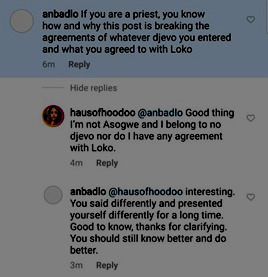
@anbadlo is my Instagram account that I use to post spiritual work and art, however infrequently, and I’ve mentioned it here before. It has the name I am commonly known by on the internet, which is pretty easy to link up to this blog and to my other online presences attached to Vodou. I wrote fairly quickly in my response below hers because I knew I was on borrowed time, as she blocks anyone who disagrees with her or that she perceives to harm her business (which is her prerogative, of course).
What I didn’t get a chance to screenshot before she blocked me was her further response saying that she would humiliate me with what I didn’t know about Haitian Vodou and that I should try going to Haiti before saying anything to her or anybody else. This was sort of eyebrow raising not because it upset me but because a) there is nothing humiliating or shameful about not knowing something and I am pretty open that I am always learning, and b) she spoke without giving a thought to who might be speaking to her. If someone was to pull me up online for posting something inappropriate or inaccurate, I’d at least click on their name to see who they were before asserting that I was an authority who could humiliate them. I also did not and do not understand why someone who claims to be a spiritual leader or authority would want to humiliate someone. Folks can be corrected without character assassination or purposeful embarrassment.
Far more interesting than those things, though, is that she denies she was made asogwe which is untrue based on her own words:

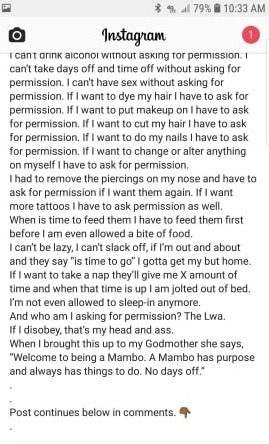
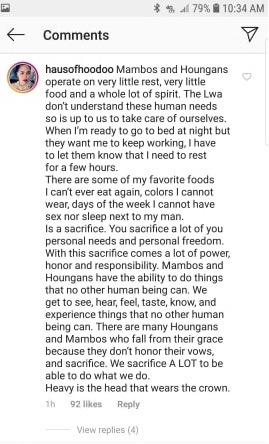
She’s since deleted this post, but it was a post that quite a few priests saw and saved. To be honest, I sort of chuckled about this because what is written here is not true about being a houngan or manbo asogwe but it digs at something more serious: her attitude and orientation of being more authentic-than-thou and being what she perceives as the most traditional of the traditionalists. Like, I come from a traditional Haitian lineage that is known for doing things traditionally, and all of this is above and beyond. I talk frequently about how Haitian Vodou is a practical religion, and it’s not practical to go bother the lwa if you want to have sex, shave your legs, or stay out late. There are situations where some of the things she has said might be true for a very short period of time, but no one does this nor is it traditional. Haitians are not going to their tables every time they want to get their hair done.
It is possible that she had some deep misunderstandings about what she was taught, it is possible she made it all up, or, perhaps most likely, it is possible that she offered all these things up to her lwa and they took them. Spirits can be opportunists and they love attention. If you commit to giving them a chicken every week, they will expect a chicken from you every week and are going to be displeased when you don’t deliver. If you offer things up, they are going to hold that as their standard. This is why discernment is important, as is maintaining ongoing relationships with a teacher and (IMPORTANT) asking before you make an offer when you are new to a religion and a religious office (priest).
It is also equally important to note that when you kanzo and come out a houngan or manbo asogwe, that’s an indelible mark that cannot be erased. You can point middle fingers at people and walk away, but that doesn’t change what was put on you. Other work and other ceremonies can be done (however ill-advised), but it can never erase what you willingly consented to and had placed on your head. Her desire to separate herself from this and her asson lineage of kanzo doesn’t mean it is erased, no matter how much you want to re-invent yourself.
But, this was kind of a fore-runner and warning sign of what was to come in terms of more-authentic-than-thou and, bluntly, honesty. In retrospect, if someone had sort of nudged her and said ‘hey, you don’t have to be doing the most of the most to be a good manbo’ maybe we wouldn’t be where we are. On the other hand, people have to take their own roads and it is not the place of any priest to really step in when there is no harm done to others. Like, if you want to tie yourself up that tightly, it is certainly within your rights to do so.
More recently, what she has posted has taken a turn for the truly bizarre. Her Instagram is a sort of echo chamber—some vodouizan read and largely do not interact, and a whole lot of people follow her who don’t have other exposure to the religion but, as before, she is standing alone. She says things and presents images that fit a narrative she creates, and it hits a nerve with folks seeking spiritual meaning or it fits an internal narrative they have, even if it is not a narrative reflected currently or historically. This is not a slam to folks who follow her or who have followed her and thought she was reflecting the Real Vodou she says she is, as we are all human and all searching for where our heart and heads feel at home, and sometimes that search has a pit stop or side quest.
She really got going with what amounts to flexing: she presents herself as powerful and untouchable, and makes statements that people she perceives as standing against her or attacking her will be harmed or killed:
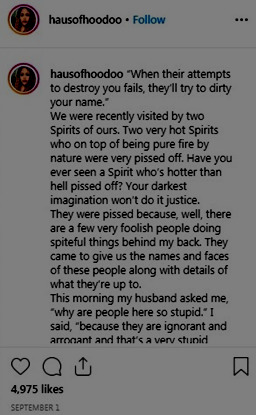

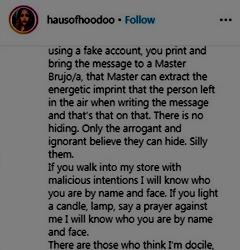



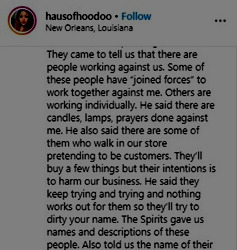

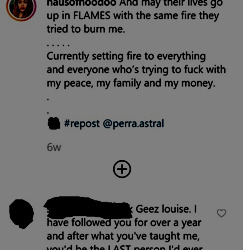
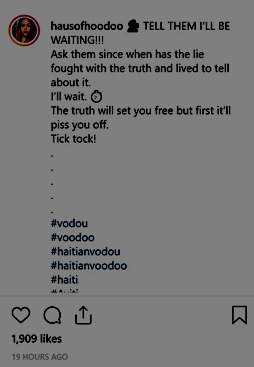
At first glance, these things are laughable, literally. It is perhaps not my proudest, most enlightened moment as a person or an houngan, but I saw this litany of fear and I just chuckled because...c’mon. COME ON. This tells a really transparent story: someone got to her or she presumes someone got to her, and she’s Bothered. So, she posts these things about how spirits are going to eat people, she’s going burn things down, people are going to suffer, etc etc etc. This is a traditional internet spiritual song; I Have Been Wronged, Let Me Put On My Robe And Wizard Hat.
In Haitian Vodou, when these moments play out publicly, it is a moment when face is lost. Haitian culture and, as follows, the religion very much has an element of ‘don’t let them see you sweat’. Like, broadcasting that work was thrown at you means they win because acknowledgment is the loss. Haitians can be super stoic when things go sideways, and they don’t tell anyone that will listen (or the internet) that they are suffering. People want reactions, so you don’t give it to them. In some ways, this is where the chuckle comes from. In Haiti, it’s the aunties cackling.
Instead, you do your work. Do. Your. Work. You go to your spirits, you do your thing, and you get on with it because when you have the juice/power to do your work and take care of your business, you don’t have to tell people that you have it. The priests and workers who are the most intimidating and who can back it up are the ones who say nothing about what they can do—they just do it and wait for the conclusion.
And, like, after a chuckle, I have compassion for those moments of outburst because I’ve been there. When you feel you’ve been hit by work or are faced by things that feel like they threaten your livelihood, it can be hard to know what to do with that as new/young priest. These are things we unpack with our initiatory parent and our siblings who have been in the same spot. This is what the family and communal function of Vodou is for.
All chuckles aside, there are things to unpack here.
Intimidation is really about control. Statements (and actions, like she is talking about here) are made not to communicate a truth, really, but to bring about a desired outcome. Like, not having people publicly question the veracity of a statement or to create an environment where, if a person steps out of the perceived line, they are the target of the same vitriolic statements and actions.
There is also the perceive importance of the statements; that the spirits supposedly showed up in a dream and named names, that people will die, bloody imagery, that she has no control over things now. For vodouizan, this is kind of front-street pedestrian stuff. Dreams happen, sometimes they are violent, we keep it moving.
But, this takes what is meant for one person and tries to use it as a bludgeon to illustrate what Jessyka wants to be taken as fact: that she is something powerful to be feared. Beyond that fear is situational only, fear does not translate to respect. When you try to assert power by fear and intimidation, you only hold people by how violent you can appear. In Vodou, that might work for a minute, but it eventually backfires.
And, this sort of atmosphere is only maintained as for as long as those who are watching are not aware that this is fear, not necessarily substance. The folks who are wowed by threats of spiritual violence are the folks who have not yet seen Haitian Vodou is practice. The illusion falls when the cracks show and when seekers see anything else. In some ways, what has been presented is another version of the emperor has no clothes.
These kind of things—the threats, the descriptions of violence—play into a Western-dominated narrative of Haitian Vodou as uncivilized and dangerous. I showed some of these posts to my roommate, who is very much not a practitioner of anything spiritual, and their remark was ‘...and this is why people are scared of Vodou’. They are right. When we start playing up this idea of warring, bloody violence as what Vodou—and Jessyka claims she has ‘real Vodou’--we perpetuate the idea that Vodou is something to be feared, that Haitians are people are somehow inherently violent, and that Haiti is an uncivilized, backwards country. This is the dogwhistle of white supremacy, and has been since the first “zombie” movie was released in 1932.
And yet, there are more serious consequences to sort of gleefully portraying Vodou as something that always punishes and never embraces. For decades, Protestant missionaries have hammered on Haiti as a godless, devil-wracked nation, and used isolated images of animal sacrifice as a bludgeon to withhold aid or set requirements of conversion or church attendance on receiving aid. Those isolated images combined with a Western narrative that amounts to ‘yeah, I’m going to send my spirits at you’ gives that sector more ammunition than they could ever need. It may not hurt Jessyka or me directly, but it hurts Haitians living in Haiti who suffer the consequences.
The thread that gets tugged when even the slightest criticism of this comes up is that what Jessyka has is “real vodou”. She’s said it a few times, in a few different ways:



These are curious statements in a couple ways. From the top, anyone who tells you they have the absolute truth and are here to wake you up or that they have the real deal (versus the “fast food”) is looking for some kind of buy-in, whether it is someone falling into the same thought patterns or a financial buy-in. These are loops to get folks who may not have had access to information before on the hook. Everyone wants the truth, right?
This is manipulative and an attempt to control—if you’re getting the truth here, why are you listening to these con artists who are only out for your money? I’m giving you the TRUTH. The Bonewits Evaluation Frame for cults and new religious movements is useful here. It’s aimed at neo-pagans, but the criteria is universal.
It also perpetuates that everything in Haitian Vodou is secretive and mysterious. It’s really not. It’s a bit of a pet peeve of mine because it perpetuates this otherness that doesn’t need to be there. The religion has moments of secrecy and seclusion, but it’s really not as much as people would like others to believe. Here, the idea that she has the truth is communicated with videos of things that she seems to think no one will have information about or have seen before, or with commentary that creates this aura of exceptionalism. It’s simply not true.

This is a video of a chèche fèy ceremony; where leaves are gathered for initiation ceremonies or other large spiritual work. Often Gran Bwa comes down and selects the leaves himself, for some folks Simbi might come down and do this work. In the video, you can see several of the folks bearing leaves on their heads are possessed or close to possessed, and they are wearing the country-style outfits that are worn for particular types of work.
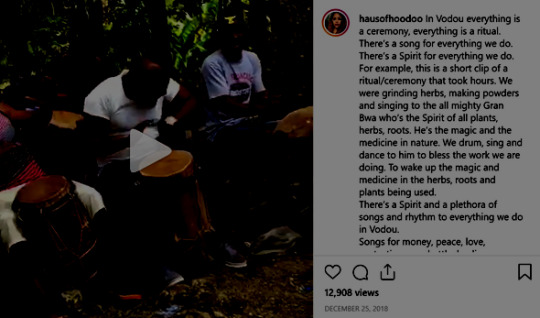
This is a pile fèy ceremony, where, as she says, leaves are being crushed for spiritual work, under the gaze of Gran Bwa. In many asson lineages, the act of crushing the leaves is part of a larger ceremony ahead of initiation, stretching for three nights to make sure all the work is finished for the new would-be initiates.

This is a video of a spiritual feeding for Danti, or Danti Bitasyon, Danti Demanbwe, and other names, who is sort of the conglomeration of ancestral spirits issuing forth from a particular plot of land. Generally, Danti possesses people who are blood relatives of the lineage celebrating the feeding. The caption is interesting because it’s an interesting read on what is happening as this is OUR spirit blessing us. Like, it is certainly possible but it’s curious. When you go to ceremonies regularly, you see spirits behave like this a lot (leaning on folks or falling into them while dancing and then dancing around the room/space) and, truly and honestly, what it boils down to is that the spirit is not yet seated fully and is sort of getting adjusted to it’s meat suit or you are simply in the way. Here, Danti is waiting for the sacrifice, which is happening or being prepared just out of view on the right in the corner, and is dancing while they wait.
The idea that it is a spirit that belongs to Jessyka and her husband is...interesting. When people talk about their spirits coming to get something or coming down, it often refers to the spirit mounting their head, ie ‘my Ogou came down at the fete last night and took his bull’. I certainly have face recognition with spirits who take the heads of others, but my spirits come in my head.
It’s also worth checking in on what Jessyka is referring to as the truth.
In Haiti, there are two main lineages of what folks call sèvis Ginen or sèvis lwa; also known as Haitian Vodou. One utilizes the asson/ason and is often called the asson lineage or some variant, and one utilizes the tcha-tcha, and is often called the tcha-tcha lineage or Deka Vodou. Additionally, there are numerable family practices specific to nuclear families that are passed to family members only.
After that, there are things that folks often refer to as secret societies, which is a weird term..they aren’t secret on the island at all. They have many names—Bizango, Chanpwel/Sanpwel, Makandal, Makaya, Zobop, etc—and a good way to describe them is Ginen-adjacent or Vodou-adjacent practices. They operate differently than most/many ason lineages or tcha-tcha lineages, and subscribe to different methods/means of building relationships with spirits and different ways of bringing people together. There are often specific color combinations and symbols (black/red, red/green, sometimes red/yellow, black/blue, coffins, etc) and an understood hierarchy explained with government-related terms like emperor, prezidan/president, renn(queen)/rwa(king). There’s often talk about being given a throne (Googling Bizango throne will show beautiful examples) and being in command and similar. A lot of people have a lot of feelings about these things, but it’s really just another way to do things. Lots of folks who have the asson also will have Vodou-adjacent practices as well; it’s pretty common and fits well together, not unlike folks who have Lucumi and Palo, or Candomble and Umbanda.
Why go into all this here? Jessyka codes and displays things a particular way that describes a Sanpwel-influenced practice, whether she knows it or not. Sanpwel is often very rooted in more rural areas and might combine with a family practice or exist alongside one. The temple complex in her videos is painted red and black, some of the dwapo displayed are styled like many dwapo in Vodou-adjacent practices are, and a lot of her language around being part of a manbo-houngan pair or the ‘chiefs’ who over see a ‘bitasion’ (bitasyon in Kreyòl Ayisyen) reflects this. None of this is a bad thing, but the idea that it is the true Vodou or the real Vodou on the island stems from folks like E.A. Koetting (of Become A Living God infamy) who got wow-ed by skulls with mirror eyes and manufactured the idea of more-authentic-than-thou. There’s no need to go all cloak and dagger about what you do, unless the cloak and dagger serves your agenda.
This sort of coding shows up when she talks about her ‘bitasion’/bitasyon. She has posted extensively about what a ‘bitasion’ is in the last few weeks, and she seems to have some confusion about it and is mixing it with other concepts from Haitian Vodou. A bitasyon is literally the physical seat of your home; your lakou/yard where you were born or where your parents had their home or where your family has lived over time. There are certainly spirits tied to place there—a family may have a Simbi who really likes one particular basin, or Freda may show a great preference for a particular tree—but how she is talking about it is curious:

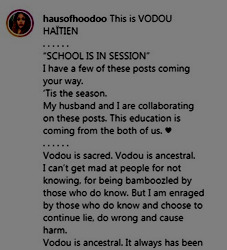


There’s a lot here that is weird, but there’s a few things to pull out specifically. She describes her ‘bitasion’ as the land she and her husband have inherited, the specific land from where her lwa spring, and the land that her family has lived and died on for generations.
So...if she says that she and her husband have this ‘bitasion’ together, she is communicating that her family and her husband’s family are related and/or the same. This would be a huge oddity in Haiti. Even relationships between initiatory siblings can be frowned upon, nevermind actual blood relations. Further, she is saying that her family has lived on this plot of land for decades, so they’d be REALLLY related. Like, brother-sister related. I can’t imagine that, if true, this would be something she would talk so much about on the internet. I assume she has misspoken or misunderstood.
It could be that she thinks you inherit a ‘bitasion’ when you marry a Haitian, as she had, but she has an odd idea about it. Like, if that’s where she is thinking on it, she’s close. When you marry a Haitian, you become acquainted with their bitasyon. Like, your spouse brings you around and you greet the land and the spirits there and are welcomed as their spouse, but you are not greeted as a blood family member would be. Marriage doesn’t change things like that. Like, folks joke rather crudely that I am Haitian-by-injection (since I am married to a Haitian man) and I am acquainted and welcomed by his family, living and dead, and can go visit his various bitasyon as his spouse. If he was in some sort of trouble, I could go to one of his bitasyon on his behalf and ask for their help...but none of that makes those my bitasyon.
She uses this idea of ‘bitasion’ to batter people, saying over and over that you must have a ‘bitasion’ in Haiti to be able to initiate into her idea of true Vodou:

She repeats this all over the place over and over. She hammers on it.

There’s a lot to unpack here. A LOT.
She out and out says that Haitians born in the Diaspora are not real Haitians and cannot be called a priest in the tradition. Not only is this deeply inaccurate, it’s jaw-droppingly disrespectful and displays a lack of understanding of Haitian Vodou. A Haitian child born in the Diaspora (outside of the country) has a bitasyon. Several, in fact, and more if they have two Haitian parents. If I have a child with my Haitian husband, they will have several bitasyon in Haiti.
The same goes for Haitians who were adopted out of the country, who were orphaned, and/or Haitians who don’t know where their bitasyon are. These realities are deep wounds in Haiti and for many Haitians, and who goes around deciding, essentially, who is and is not Haitian? Like, this isn’t even addressing the spiritual fucked-upness of those statements, but purely from a human standpoint. No one gets to decide who can access their Haitian lineage or call on their birthright. It’s not just insensitive, it’s rude.
This pulls up what actually made me upset when I read a lot of these posts: the temerity of a non-Haitian to make pronouncements about Haitians and dictate what Haitians can do. Like, a legit priest is a legit priest and has the authority to speak on the religion, but the caveat—PARTICULARLY for non-Haitian priests—is that you speak with grace and a bit of elegance, especially around issues of identity when it comes to the identity of the people who allowed you into the religion.
There was a particular example that tapped into some anger and was the straw on the houngan’s back that made me decide to write this entire post. Unsurprisingly, it comes from a post about ‘bitasion’:

I missed it on my first read because there’s just so much to read, but when I saw it I had to put my phone down for a bit and go do something else. Out of all the stuff that’s here so far (and all the stuff to come), this is truly what made this post a reality.
How do you show up and do this in a country where the average weekly income WAS (because ain’t nobody really working right now when it is essentially civil war) less than $4USD a week for Haitians living in urban areas? Are you really going to put poor rural folks through the indignity of having to ask to cut some firewood? This is a brand new version of an outsider trying to show they are a gwo blan via power and control. These days, people in Haiti are used to it because it comes via missionaries and NGOs and the voluntourism of folks who show up to take pictures with orphans and hand out candy.
There used to be a different word for an outsider who punished folks working the land to survive: overseer.
This is the re-institution of colonial systems, and it’s pretty ugly, particularly coming from someone who is not Haitian. You can certainly be the sort of priest who wants to punish rural folks for cutting some firewood and then brag about it, but should you be? Really?
But, the biggest issue about her saying that you must have a ‘bitasion’ in Haiti is that she seems confused about where her ‘bitasion’ actually is. First she was born in Cuba:
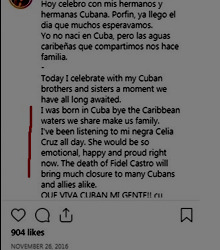
Then she was born in the DR with lots of family memories and history from there:
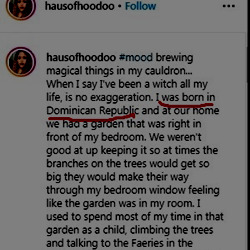
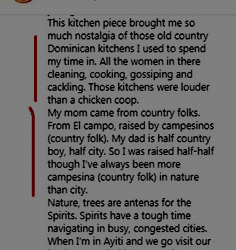
To be completely blunt, I have a hard time swallowing someone else’s requirements about a Haitian bitasyon when they do not have a consistent story about their own bitasyon.
Next to the thread of what Jessyka believes is true vodou is this thread of confusion. It’s visible when she talks about her ‘bitasion’, her background, and it leaks out in a lot of other places:
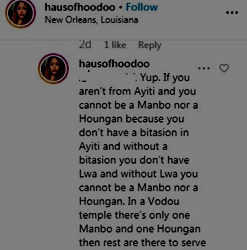


There’s so much here that it is basically word salad:
There is no religion in Haiti (or on the island) called Asogwe. Asogwe is a rank of initiation in the asson lineage
Any temple that only has one manbo or one houngan is not a thriving temple. The idea that a temple will only make one houngan and one manbo per generation is hilariously uninformed. Go into any temple in any part of Haiti, and you will find a wealth of houngans and manbos spanning generations because the ceremony doesn’t go without many hands made to do the work.
Yes, initiation costs money. I paid $8,500 plus airfare for mine, and, after going through it and going back to work the ceremonies each year since, I think my mother should charge more. I know exactly what was purchased with my money (I got an itemized list), and I know that my kanzo was done ethically and as equitably as possible—each person who worked on my behalf (at least two dozen houngans/manbos, innumerable singers, drummers, people who cooked, people who slaughtered animals, people who did laundry, people who drove, and on and on) was fed and was paid for their labor. No one should be asked to work for free, and no one should want a low-cost kanzo because no one should be wondering if corners were cut in the making of their head.
If she thought her kanzo was empty and meaningless, perhaps it was because she left before she could learn.
It is true that I and other non-Haitians do not come from a bitasyon in Haiti, but I descend from my spiritual mother’s demanbwe (essentially a field of ancestors not tied to place), which is a key facet of why the asson lineage exists and why it has spread...there must be ancestral approval before extending the asson for ‘adoption’.
It is perversely amusing that someone who left an asson lineage less than six months after they completed their kanzo elects themselves as an expert who can dismiss literally hundreds of years of lineage and ancestral work and Haitians, all to sell some candles.

She has a core misunderstanding on what a “zombie” (zonbi in Kreyòl Ayisyen) is. A zonbi, at very base, is a soul held in servitude and controlled by the person who created it or by the lwa who owns it. They don’t mount people and they aren’t given in kanzo as she thinks. White folks and non-Haitians get mounted and it’s not uncommon. There’s even video out there, embarrassing as it may be, of me beginning to get mounted with a spirit. She’s uninformed and is speaking on things she has no experience in.
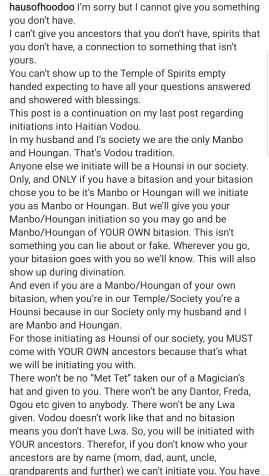


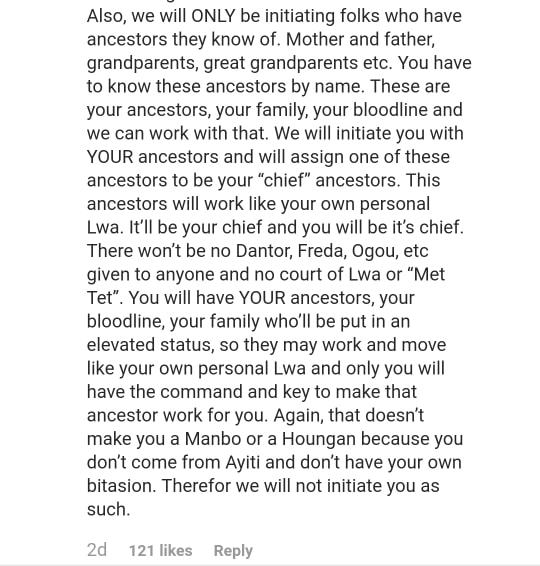

People should read these posts very closely. Remember when I said way up there that I like to watch people because they will show you who they are? This is Jessyka Winston showings us who she is.
She is out of ceremony less than a year. She walked from previous commitments after two months. Now, she is telling you how she will initiate you. She says over and over that an asson lineage initiation is a scam, but this is a blueprint to take money and do nothing.
She will initiate you only as a hounsi, but you’ll be the manbo of your ‘bitasion’ IF your ‘bitasion’--the land and the spirits passed to you by your family—tell HER you are valid.
If they tell her yes, she’ll give you a manbo/houngan initiation so you can go be a manbo/houngan of your own plot of land….but you are not a manbo/houngan in their temple because There Can Only Be One
You can’t fake it, because they will know.
There are no lwa involved in any initiation.
They’ll know if you’re lying, but it will also come out in divination.
You can only serve your spirits of your ‘bitasion’, but the spirits of theirs will recognize you as a hounsi
Ancestors cannot be sold or bought.
They are going to do things differently
So, to serve your ancestors as a priest, you must pay for two initiations, and it’s going to be pricey because, as she says, her work is VERY expensive:
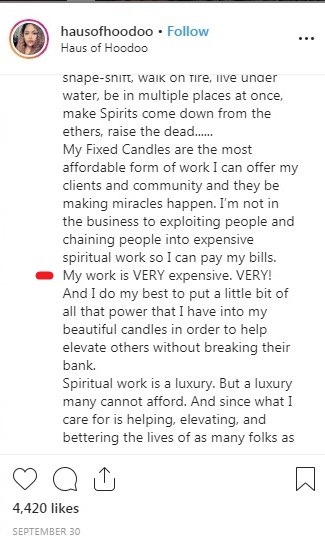
She is willing to charge $157 for a non-specific half hour spiritual consultation, and will require a $28 fixed candle and a $12 headscarf be purchased for that as well, so it’s not going to be an initiation that tries to keep costs low.
That first initiation is to hounsi, which makes you a servant of the house. You’ll be expected to show up and help with things, and probably financially contribute.
If you have the desire to be a manbo or an houngan, she is the one who is going to speak for your ‘bitasion’, which is a plot of land but also ancestors, and tell you whether or not you have a future as a houngan or a manbo. If you do, it’s another initiation which you will pay for and probably pay quite a bit more because you’ll be a priest. When you start propitiating a bitasyon, that requires big ceremony to feed them...so animals, people to dispatch animals, cook the animals, drummers...all kinds of stuff. In Haiti, with the way things are going, you’re looking at more than $10K for that...and they’re going to have to do it for you, because you’re not a manbo or a houngan yet.
There are no lwa involved in this, because that’s a scam. There can’t really be any ancestors involved, because you can’t buy or sell them and so they can’t really do anything for you there except feed your ancestors….? Except she thinks that’s a scam, too:

Even after you’re a manbo or a houngan of your ‘bitasion’, you’re still a hounsi with them and still have a responsibility to their spirits..even though you aren’t from their ‘bitasion’. I guess that means you’re still dependent on them, right? It keeps you a servant?
But, what’s a little dependency and servitude when you’re a manbo or houngan of your own ‘bitasion’. They’ll assign you a ‘main ancestor’ to work with...but that’s not like a met tet that they would pick out of a magician’s hat. So, you’re good, right? Oh:
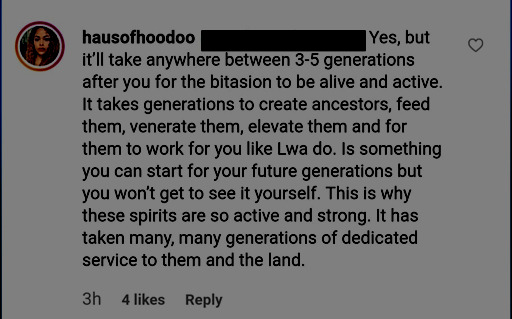
I want folks to go look at the Bonewits tool again. I want folks to have that open in one window, and this open in another. Read carefully. She is not yet saying she is doing this, but she is paving the road to make this look authentic. It’s not, it’s psychobabble word salad with a price tag attached. She is telling you right upfront—doing things differently, changing the fuckery—that what she is giving is not traditional Haitian Vodou. She is making things up and planning on bankrolling her retirement home on someone else’s back.
She doesn’t even have any support for this because she doesn’t consult elders, she just goes ‘straight to source’:

Haitian Vodou is based on family. Vodou-adjacent rites have hierarchy. If she is not adhering to this, she is not practicing Vodou, she is practicing Jessyka Winston with Haitian trappings and accessories. The religion changes and grows, but it is never at the behest of one individual and her husband—it is at the behest of the lwa, who we serve and there are ways that happens, which is well-documented over the last couple hundred years.
She is telling you who she is right now, PAY ATTENTION.
If you have been saving up for a $157 half hour consultation/$28 fixed candle/$12 moushwa value meal, you are better off throwing your money in a bonfire and cracking a beer. Don’t buy pretty packaging when the insides are rotten.
It is one thing to create this atmosphere of disinformation on your own, with your own name, but literally within the last 24 hours, she’s gone further:

Now she is naming specific people as not being real Haitian Vodou. The kicker? Manbo Carmel was the manbo Jessyka did kanzo with in 2018. In roughly a year, Jessyka has decided she has enough experience and knowledge to determine what is real and what isn’t, and what is Haitian Vodou and what is not. The sheer balls it takes for a non-Haitian to say that what a fairly well-known Haitian is doing is not Haitian Vodou is staggering. This is not brave or anything, it’s just unchecked and uninformed arrogance.
This is not the first time Jessyka has done this, though. Not that long ago, she came for my mother and the sosyete I’m initiated into:

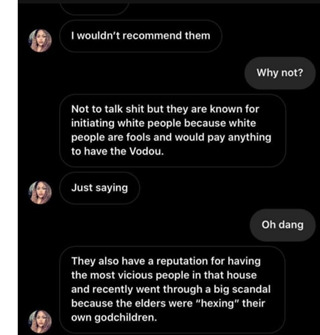
She sings an old tired song and performs a busted old dance. The line that white people are too stupid to function is one that she likes to repeat regularly, and she keeps going in on cost like she won’t be asking people to pay for her back-issue-magazine-collage version of an initiatory experience. She brings up a rumor that’s been dead for years, and makes it clear (for folks who have been around for more than 10 minutes) where here info comes from.
The worst part is that this is what she did when someone shared their process, and she did it as a priest because she had already kanzoed at that point. That’s a level of immaturity that someone needs to be better than when they call themselves a manbo or an houngan. Operating on rumor and spreading gossip is what teenagers do, not priests who care when people are coming to them asking questions.
And, like, “not to talk shit..”? Come on. Come correct on stuff like that. If you are going to talk shit, then talk shit and own it and own that you are spreading rumors that you were not a party to because they have been floating around out in the ether since before you even thought about making kanzo.
There are also ways to speak to and about elders when you think misaction or harm has been done. If you really thought Manbo Maude was out here hexing her children and hurting her lineage, there are ways to approach it. Like, she’s not hard to reach or hard to find; you could call her directly. I know she’s spoken about it to people before, one of them being me because I asked when I heard the rumor. Or, you could approach one of her numerous, visible children and ask them out of concern for their well-being and safety. Or, you could approach any of the priests who make their friendship with Manbo Maude and Sosyete Nago known, which is easy to track down on Facebook or in any of the documentation about what the sosyete does that’s online. But, when your goal is to defame so you can elevate yourself above all of that, this is what you do.
Since she proclaims she knows and understands Haitian Vodou, she should understand the culture Haitian Vodou has high expectations of how children and younger people treat elders, both in age and in religious settings. You don’t do this. You don’t go out of your way to character assassinate an elder, even if you think they are absolutely 100% fraudulent. You can disagree, you can say it politely, but you don’t act like an ill-mannered playground bully and you don’t pot-stir. This is basic cultural knowledge.
My initial reaction when seeing this was ‘well, she really tried it, didn’t she?’, and that was followed by showing it to a sibling or two and noting that if I ever did something like this, my manmi (Manbo Maude) would have my head on a platter. Like, I would get a phone call and the conversation would go something like “right or wrong, you do not do this. I raise my children better than this”. I have been very gently pulled up for much more trivial things, and when that has happened I have wanted the floor to open up and swallow me whole because I was so embarrassed. Not because Manbo Maude embarrassed me, but because she sat across from me, looked me in the eye, and told me she expects better of me because she knows I can be better.
Sadly, Jessyka does not have this grace in her life, because, as noted above, she believes elders are a scam.
And yet, she keeps digging. This morning, she went in on a transwoman who pushed back at her assertions that everything that does not flow from Jessyka is fake news fake Vodou and called her a man:
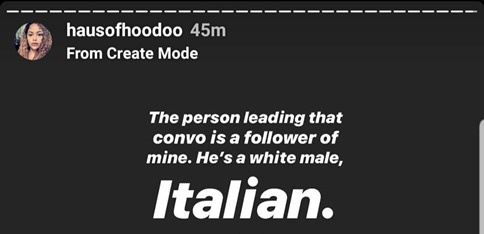
Like, you can disagree with someone (and Blair, the person Jessyka is talking about, and I have disagreed) and still not disregard humanity and gender. Again, Jessyka is showing us who she is.
Then, she starts flexing, because she’s catching some heat:
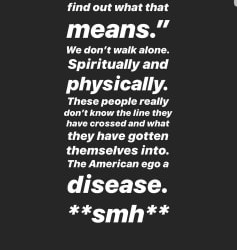

First it was send the spirits, now it’s haul out the Masons. Maybe it’s watch out for little green army men outside your door? Like, folks who have the power don’t need to say they have the power. They don’t need to say their boys are coming, because their boys are already there. This is immaturity on display, and she should know better and be held to better by people who care about her…that freedom horn is just the sound of her own voice, echoing into the depths of Instagram, of all things.
And none of these people who she keeps posting quotes from are speaking for themselves. Not her husband, not her Mason friends, nothing. Anyone who has spent five minutes in a group of Haitians knows that, when folks have something to say, they don’t need someone else’s mouth to say it.
And, like, why not try some chante pwen on your *Instagram story* when you need to look hard? Girl WHAT? I had some inappropriate laughter because This Is Not How Things Work:
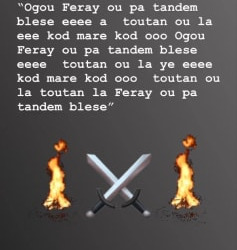

She goes on at length about people not coming to her page to discuss with her…but why? Like, why invest that way when she deletes and blocks and throws Instagram temper tantrums? She doesn’t want to hear anything but what she knows, but desperately wants engagement. She tells Haitians how to be Haitian, but then doesn’t understand why the folks she aims at—houngans and manbos who have had the lwa on their head for longer than she has been alive—won’t engage with her.
There’s a really simple and straightforward answer that has come up already and that is really at the root of all of this: they don’t care. They are not invested in addressing whatever random, strung-together nonsense some blan who cannot describe where she comes from or how she came by what she has post on the internet, because their spirits and their lineages speak for themselves. Likewise, she keeps wondering why non-Haitians keep speaking up, and it’s because it’s the job of non-Haitians to collect their own. Why would anyone expect Haitian practitioners to dig in to this?
If someone did care and was invested, maybe she would have gotten some mentoring around this. Maybe they could have talked things through with her and helped her clarify what she was thinking and feeling so that she could post organized thoughts, instead of a stream of consciousness laced with words she might think give her an air of authenticity and threaded with threats and intimidation. Maybe someone could pull her up privately.
But, we are here. There’s a lot more and it looks like she is posting more by the minute. She couches it as it being co-written by her Haitian husband (maybe for authenticity?), but it is her name on it and no one else’s. She wants people to be scared, but there’s nothing to be scared of. She wants people to be intimidated, but there’s nothing intimidating here when you know how to see past the frothy, frenetic posting and really see what she is/is not saying. She wants to keep identifying people and why they are not valid in her eyes, she can keep going.
She’s probably going to try and tell me some things about myself or insist that she’s going to have her spirits kill me or that Masons are outside my house right now and….whatever. It’s okay. I know who I am.I don’t walk around scared.
But, I mean what I said in the beginning: Jessyka is not beyond redemption or repair. She can turn all this around in a heartbeat and make a different choice. The lwa have immeasurable grace for us and all our human failings and, if we can be humble, they can give that to us when we need it most. She has a spiritual sickness and deep spiritual problems, but that’s nothing that can’t be treated because we have the treatment.
We. Us. Community.
She has set herself apart, but she doesn’t have to be alone. We are a community, and if she reached out there would be an answer. Part of calling out bad behavior is calling someone in to heal. She can heal what is clearly a hurting heart and a confused head because we can heal a hurting heart and a confused head. When one suffers many suffer, and her suffering is palatable. I would invite her to bath with cool water and fresh basil, and to sit with Legba for a bit and look for the other path. We are always given two paths, and we can always make a change. Ginen promises us balance, but only if we seek it.
Today, for Jessyka, for folks reading this, and for the general atmosphere of dis-ease and confusion, I pray for cool heads and peaceful hearts, and for the knowledge that, if we are brought to the table, there is a unique place for all of us.
Blessings,
Alex Batagi/Bonkira Bon Oungan Daguimin Minfort
Pitit Antiola Bo Manbo, pitit Selide Bo Manbo, pitit LaMerci Bo Manbo
Sosyete Nago/Kay Manbo Maude, Jacmel and Boston
October 2019
#vodou#haitian vodou#real vodou#vodou culture#vodoun#vodun#voodoo#new orleans voodoo#louisiana voodoo#mami wata#new orleans#conjure#hoodoo#rootwork#folk magic#haus of hoodoo#hausofhoodoo#jessyka winston
204 notes
·
View notes
Text
now that i’ve emerged from my annual jesus christ superstar rewatch i have some new insights! lets talk about the theme of free will vs fate in this musical
before i start, i’d like to say that this is an examination of free will vs fate in THIS MUSICAL and not like, biblical canon. this is a view of a musical as a piece of media
now, the musical opens with the cast of actors in normal 70s clothes getting out of their big old 70s van, getting their supplies together, joshing each other, getting into costume, and setting up the scenery. while i’ve always thought of this more as just a cool framing device, i think that this supports the reading that i’m doing here today.
okay, so. lets assume that show that these are actors playing characters is intentionally alluding to the fact that, textually, these choices and events are not ones chosen by the characters or people participating in them, but pre-ordained and impossible to escape. lets assume that they’re equating judas, pilate, and even jesus himself to actors working with the lines and stage directions that they were given.
that actually works with the text of the musical itself.
jesus himself has no idea of god’s motives for demanding his death and is never portrayed as an active participant in this. jesus asks many times throughout the course of the number for some sort of explanation to be met with silence. assuming that we interpret the set of photos of his crucifixion which cycle near the end of the song as a literal projection into his brain, then he never gets an explanation, just a “do this”.
a line that comes after this scene is
“ Why then am I scared to finish what I started What you started, I didn't start it “ which emphasizes, again, that jesus himself has had no agency in this situation. directly afterwards we get the section where he accepts because “God, thy will is hard
But you hold every card”. he calls his lot a “cup of poison” and demands that god get this over with before he changes his mind. which is of course, impossible in the narrative that we’re being presented. even if jesus had changed his mind and immediately tried to run the way that destiny is being presented he would have ended up in the same place anywhere. jesus accepting that he had to do this wasn’t a choice.
pilate, too, is shown to be bound completely in the chains of fate. pilate, in his first appearance, sings a song about his prophetic dreams of the passion, ending with jesus being mourned by christians after the fact and pilate himself getting blamed for the man’s death.
pilate, for whatever reason, tries his hardest to keep jesus from dying. he might be a dude who doesn’t want an innocent to die. he might be trying to prevent his name from being dragged through the “slime and the slime and the slime and th muuudddd” as judas puts it, but pilate tries his hardest to save jesus.
he demands to know what jesus’s crime was, to no avail. he tries to push the problem off onto herod, to no avail. he asks jesus to talk to him so he’ll at least have something to work with here, but jesus refuse because what’s the use? as jesus says, “I look for truth, and find that I get damned”
pilate tries to say that jesus is crazy and can’t be held accountable for his actions- what if we just flogged the guy okay? will that make you happy? crazy crucifixion crowd?
and none of it works.
jesus tells him that he has no power and that any power he has comes from above. pilate craddles his beaten body gently and says “please, let me help you. let me help you. i want to help you. just give me something to work with. please”
and jesus says, “You have nothing in your hands Any power you have comes to you from far beyond Everything is fixed, and you can't change it” and the chorus keeps singing crucify him! crucify him! and pilate finally gets the blood on his hand. presumably, he thinks back to the dream, thinks about how this was all set in stone the moment that this man came here. so he washes his hands.
fuck it, whatever. don’t let me stop you from killing yourself, “misguided martyr”. i wash my hands of this you “innocent puppet”.
nothing that pilate could have done would have saved jesus or taken away the blame that he was destined to be saddled with.
and in the narrative, nothing could have saved judas from being “saddled with the murder of you” by betraying jesus. his initial talk with caiphas, the high priest, might have been of his own accord and a thought that he could end what he viewed as jesus going crazy and bringing attention to them that was going to get them killed and wouldn’t help anyone, but by the time that judas DOES betray him, the blame doesn’t belong much to him. after jesus confronts him he’s like wait you?!?! want me to betray you!??! and jesus is like just fucking do it already judas i’m tired
and judas just runs away and like, thinks about stuff, because this is heavy. and he doesn’t know if he’s ready for this. but jesus chases him down and urges him to just grow a pair and do it. and then judas does do it at his urging and he realizes that they’re going to crucify him, which was not in the judas plan, and he realizes that he’s been spattered with innocent blood and his name will be dragged through the slime and the slime and the slime and the mud
he hangs himself, and the next time that we see judas, he’s in white and pleading with jesus to explain why he came when he did, why he didn’t have a plan. why judas had to be part of this atrocity and there’s no explanation. beyond the implication that judas went to heaven for acting as the pawn in this, there’s no explanation of why any of it happened.
so really, jesus christ superstar is just a bunch of miserable, confused men who were implicated in the death of this one dude who are miserable and confused and did not want to be implicated in that death.
free will was nothing compared to fate in this one.
20 notes
·
View notes
Text
Biscuit Reviews Assassin’s Creed

I have quite a history with the Assassin’s Creed franchise. I’ve kept up with all of the main line entries and even a couple of the mobile spinoffs. Even though the series has become controversial in some aspects, I find enjoyment in the protagonists, the historical settings, and the whole First Civilization lore. It’s gotten crazier and more outrageous as the years progressed for the series but I think that’s part of charm.
With my wife wanting to see more of the series after playing through Assassin’s Creed: Odyssey, I introduced her to some of the previous past entries in the franchise as they’re a lot more polished in the gameplay department. So with that I figured I would go back to the older titles, to see how they have have fared in the passage of time. What better way to view this than playing the original Assassin’s Creed.
I had a lot of fun doing a series overview on Kingdom Hearts, so with ignitied interest of Assassin’s Creed with my homelife I figured I’d go back and do the same for the Assassin’s Creed franchise as well.
I’m going to take it on like I did with Kingdom Hearts, tackle the series in small sprints, rather than all at once.
As for my memories with the original Assassin’s Creed, I remember liking a lot of the ideas of the original. Assassin’s Creed was even the first game I ever wrote a review for and I still have the original copy of that review to this day. Looking back at it now it’s quite a mess and a bit embarrassing but I also gave it a score of an “8 out of 10.” which would translate as a 4 out of 5 in the scale I currently use.
Ok, that’s a fairly high score. Let’s see if I still think that when I revisit the start of the Assassin’s Creed series.
You are Altaïr Ibn-La'Ahad, an Assassin during the Third Crusades tasked with killing 9 Templars as they are the 9 that know the secret of a powerful artifact that the Assassin’s Order acquired. Although the bulk of the story is experienced during this historical event, you are actually reliving the past. This past is actually part of a simulation in the world of Assassin’s Creed. A man named Desmond is experiencing this past through the Animus, a device that allows the user to witness the lives of their ancestors. Desmond has been captured by a mega corporation known as Abstergo, who is looking for this powerful artifact, known as the Apple of Eden. Abstergo believes that Desmond’s ancestor is the key to finding the Apple of Eden as well as other artifacts left by the First Civilization.
The gameplay for Assassin’s Creed will have Altaïr traveling between three different cities, Damascus, Acre, and Jerusalem to hunt down his targets. Once he reaches this city he will then need to report to the Assassin’s Bureau within that city to get some possible leads on where he can find information on his target. Once acquired, Altair will partake in a series of tasks to learn more about his target. These tasks involve, Eavesdropping, Interrogation, Pickpocketing, and Informant Missions.
You’ll need to complete these tasks to learn more about your target such as their location, recent events they’ve done, assassination opportunities, guard activities, and entry and exit points from the area your target will be in. Although these tasks can feel repetitive, It is awesome that you have to learn about your target and the surrounding area making you feel like an Assassin with a plan. After you commit the Assassination, you then have to escape from the area and return to the Bureau. This was my favorite aspect of original Assassin’s Creed. It’s that rush of having to escape and lose the guards chasing you that can make for some interesting ways to lose them.
Originally the repetition was the only issue that I had with the game so after replaying this game are there any other issues that I might have with game after the series itself has evolved? Yeah, quite a few actually. First, is the way Altaïr moves. He moves incredibly slow and clunky. Even climbing up buildings he’s slow. I understand what Ubisoft was going for at the time, have an Assassin that’s a blade in the crowd to where he is inconspicuous and doesn’t raise suspicion, but when it comes to some of those escape sequences I was talking about earlier, it can be a pain when trying to lose guards on the ground level and trying to get to the rooftops to traverse the city more quickly.
This next issue is rather a personal nitpick of mine, but it’s still something I figured is worth mentioning. There are no subtitles. When I play game I usually like to have subtitles on because there’s a few instances where the VO might say something that I don’t quite catch or pick up. Although there’s no standard or mandate that subtitles need to be present in a game, this was something that was a bit of an issue with me, especially since Assassin's Creed does have fluctuating audio levels. Sometimes you can hear the characters just fine and can understand them no problem, other times, they’re speaking so low and softly that it’s really hard to understand what they’re saying.
Speaking of the audio perspective of this game, Nolan North voices both Desmond and Altaïr in this title and his performance is...not good. He sounds bored when he’s portraying Desmond and when he’s portraying Altaïr, well he sounds like he’s bored but with an edge, he’s edgy bored. Even Kristen Bell who plays Lucy, a woman who tries to help Desmond out, sounds bored with her performance. The only voice actors that sound like they’re giving an effort are Phil Proctor, who voices Warren Vidic, Haaz Sleiman, who voices Malik Al-Sayf, and Peter Renaday, who voices Al-Mualim.
Also the whole, be a blade in crowd aspect, it’s not really present in this one. Sure there are crowds and you’ll have to navigate your way through them sometimes, but you can’t really use the crowd as cover. Instead, it’s more like you’re trying to overcome an obstacle to get to the target. The only time you can hide in the crowd is if you find a group of priests that are praying and that’s it. Even then they’re mostly used to enter places.
Now, I’m not sure if this was a game issue or an Xbox One Backwards Play issue, but I did notice that building walls would occasionally flicker. I don’t remember this ever happening on the Xbox 360 and I wasn’t able to go back to check on this due to the disk tray on my 360 no longer working. I do know that some titles using the Xbox One Backwards Play do have issues so that’s why I’m willing to bet it’s an issue with backwards compatibility rather than the game itself. It’s not game breaking or anything, but can be distracting in some cutscenes.
As for how the game has stood against the test of time, it has not aged very well. The sequels are much faster and various entries made improvements in their own ways which I’ll discuss when I get to those titles. However, if you’re interested in seeing the beginnings of the franchise as well as learn how the science of the Animus works, then it’s definitely worth a visit, just don’t expect much action as this game wasn’t as action focused as any of the sequels. The slowness might be a turnoff for some and that’s understandable, but if you power through it you’ll pick up on some interesting stuff on how this game laid the foundation for the overall lore of the franchise. If you were a fan of the series and haven’t played the original one in awhile I do recommend that you do back to it, you just might be surprised on some of the lore details you pick up on now that the story of Assassin’s Creed has been fleshed out more in the sequels. If you came into the series in one of sequels, my recommendation would be to slowly work back to this title or just simply read up on a plot synopsis online.
Looking back now I don’t quite think it’s that 8 out of 10 my past self gave it in 2007. Honestly, it’s more like a 2 or maybe a 3 out of 5, both scores which I can see.
I can see the 2 because of how rough the gameplay is and how slow and repetitive it is as well as some of the technical issues. However, I can also see a 3 because at it’s time it was a cool unique idea on how to approach the open world genre. Especially with the mark it made on the genre. Some would argue that Assassin’s Creed II left a more lasting impact, and I would agree, but the impact that second game left, would not have been possible, without the first steps of the original title.
As for overall score, I’m going to go for the higher end because I do have a soft spot for this game. I’ll whole heartedly admit that it’s the nostalgia and my fondness for some of the gameplay elements in this game that has me giving it that score. I feel that’s how it is with some of these reviews, especially when critics review a media from their past. There’s going to be that looming essence of nostalgia there and sometimes it can be hard to separate when reviewing these past pieces of media. But, I think if you’re able to admit and see the flaws, it could have you appreciate something from the past more, as well as what has come from those beginnings.
Assassin’s Creed receives a 3 out of 5 (with justification of a 2 out of 5).
#Assassin's Creed#AC#Ubisoft#Altair#xbox#ps#pc#video games#gaming#games#video game review#games review#gaming review#game review#biscuit reviews
2 notes
·
View notes
Text
@miladylily apologies for the late response, school and life events happened, but since this would be a longer explanation, I figured I’d add it onto my post rather than in several pieces in the replies :)
But this is also for anyone who was curious as to the reasoning behind this!
Why Vikings are portrayed with horned helmets, even though it’s historically inaccurate:
First things first, here’s the quick bit on why it’s inaccurate.
Throughout the numerous years of searching and searching, archaeologists have been unable to find a single, definitively “Viking”, helmet that sported the horns we see in media and movies. Not ONE. To further build on that, they DID find only one definitively Viking helmet in 1943 on a Gjermundbu farm in Norway, north of Oslo, and it is a simple rounded metal skullcap with a guard around the eyes and nose, pictured below.


In further addition to this, in all depictions of warriors from the Viking era, between the 8th and 11th centuries, warriors appear either with simple helmets like the one mentioned above, likely made of iron or leather, or weren’t wearing any head protection at all.
Now, the popular image of Vikings wearing horn-adorned helmets can be dated back to the 1800s when Scandinavian artists like Sweden’s Gustav Malmström included horned headgear into their portrayals of the raiders. (My own people. Unbelievable.). It’s also HEAVILY attributed to when Wagner staged his “Der Ringdes Nibelungen” (The Ring Cycle), a cycle of four operas by the German composer loosely based on characters from Norse sagas in the 1870s, and its costume designer, Carl Emil Doepler, created horned helmets for the Viking characters. (Don’t even get me started on his designs for the Valkyries, I’m fairly sure it’s because of him also that female video game armor is the way it is). Doepler is the one most widely agreed upon to be the main person at fault for this standard. This all contributed to numerous cartoonists, filmmakers, and artists continuing this stereotype right up to present day.
Now you’re probably looking for a reason as to why horns were even considered to be put on helmets for Vikings in the first place. I have that answer too. It’s the theory that all these artists/people were in fact inspired by discoveries in the 19th century of horned helmets. HOWEVER, it was figured out that those particular helmets actually predated the Vikings by at least a whole century. Also, they may have also gotten the idea from Ancient Greek and Roman chroniclers, who had described Northern Europeans as wearing helmets decorated with all sorts of ornamentation, from horns to wings to antlers. However, as mentioned, this style “fell out of fashion” a century BEFORE the Vikings, and given the lack of physical proof, it’s hypothesized that these kinds of headwear were only really worn for ceremonial purposes by Norse and Germanic priests. Historians make a half-confident GUESS that if any Viking were to wear a horned helmet, then it MIGHT have been the Berserkers, who are already going nuts on the battlefield and are literally only caring to scare the shit out of their opponents in any way they can before they destroy them. But this is still also just purely an idea with no actual proof behind it.
A quick sidebar to explain those headdresses: historical transposition. Germans were fascinated by Vikings, mostly due to the fact that they represented a classical origin story free from Greek and Roman baggage (something hard to find in Europe, more often than not). This generated a lot of appeal in an age of developing German nationalism, and as a result, Doepler and other scholars intertwined German and Norse history in a surprising way; they put ancient and medieval German headdresses (like horned helmets) on Viking heads.
Historical reasons aside, and to answer the “but horns are cool” reply on my original post, is of course the issue of practicality, especially in the world of Vikings. Horns on helmets would be a nuisance, would just get in the way, and could potentially frequently get caught on things. Horned helmets would have also caused problems on board their longships/warships, where space is already incredibly limited. (Hell yeah, let’s gore our buddies eyes out while we wait to storm this next beach). Not to mention how likely and bad it would be to have an enemies sword or axe get caught on one of those lovely horns and just either fully remove your helmet in the middle of battle, or cause your helmet to harm you instead.
This concludes my Ted Talk, thanks for tuning in :)
It’s 2020. Please stop writing and drawing Vikings with horned helmets. I’m still seeing some of you do that. They never had horns on their helmets, that is the work of fictional media.
- sincerely, a Scandinavian
139 notes
·
View notes